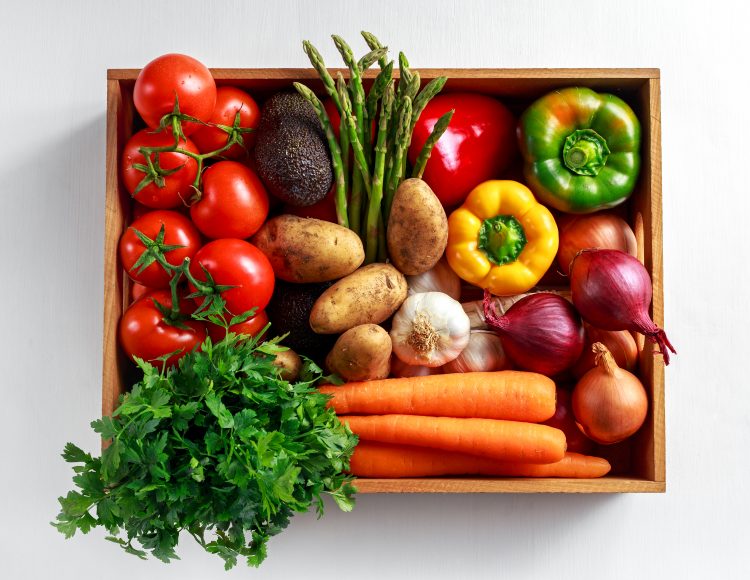Healthy meals that are nutritionally balanced can help us remain well in times of stress and also provide support to our immune system. Here’s a quick guide to the kinds of foods that provide 10 key nutrients for immunity. Plus, some useful tips on the more unusual foods that you might be able to find when supermarket shelves are empty of basics.
10 key nutrients for immunity:
- Vitamins C, A, D, B6 and B12
- Iron
- Zinc
- Selenium
- Folate
- Copper
Fruit and vegetables are a great source of nutrients but be assured, they don’t have to be fresh – canned or frozen is fine. Aim for colourful fruit and vegetables and don’t forget dried fruit too.
Vitamin C and Iron
For vitamin C – broccoli, tomatoes, cauliflower and green leafy veg should be on your list. Vitamin C provides immune protection in the nose and throat and helps the body absorb iron – another key nutrient for immunity. Iron is in most green veg, especially peas, broccoli and green leaves.
Remember, vitamin C is easily lost in cooking – if you can get hold of fresh vegetables, eat some salad – especially red peppers, which are highest in vitamin C. Veg should be lightly cooked (steamed or stir-fried) – not boiled.
Any citrus fruit is good. Orange juice is a great standby and apple juice may have vitamin C added to keep it fresh. You don’t need much vitamin C but you should aim to get some every day. Just one small orange or quarter of a medium red pepper will give you your vitamin C for the day.
Top tips for ‘out-of-the-way’ ingredients are tinned blackcurrants and guavas, which are amazingly high in vitamin C. You could also top it up by sprouting lentils and beans at home, or if you can find dried peas – grow your own pea shoots. Tinned fruit such as pineapple or mandarin are useful store cupboard items too.
Vitamin A
For vitamin A, aim for yellow or orange coloured vegetables: carrots, sweet potato, and butternut squash keep well and are really good options. Any dark leafy greens would be good, including tinned or frozen spinach. Look out for tinned or dried mangoes and dried apricots.
Vitamin D, B6, B12, Zinc, Selenium, Folate and Copper
Vitamin D is in eggs, fortified breakfast cereals and margarine, but only in small quantities. The sun won’t be strong enough until May for us to make vitamin D through our skin and, we’ve just come through the winter, so it’s worth considering a supplement. Also, we don’t know to what extent some of us will be able to get outdoors.
Dairy products such as yogurt not only contain vitamin A but also B6, B12, zinc and selenium that all help keep the immune system active. If chilled dairy products are in short supply then don’t worry, dry store cupboard foods can come into their own to provide these nutrients. Fortified breakfast cereals and fortified dairy alternatives along with yeast flakes and fortified yeast extract can really help with vitamin B12 or B6 intakes.
Nuts and seeds are a source of zinc and Brazil nuts are particularly high in selenium. Copper is found in cashews and peanuts contain folate, while nut milks and nut and seed butters can all contribute nutritionally too.
Dried ingredients like pulses and grains are really recommended because they supply not only iron but zinc, selenium and folate. Bread, oats, rice, quinoa and couscous along with beans, lentils, chickpeas and any other pulses should be a part of meals, especially if you can’t get hold of your usual tofu, Quorn or soya products.
If you’re feeling adventurous, you could look into sprouting your lentils and beans which increases their nutritional value – especially their zinc content. Dried fruit such as raisins, dates, prunes and figs are a good source of iron and apricots and mangoes provide vitamin A.
So, with some foods in short supply it’s worth taking the time to make a list of the more nutritious foods and stock up when you can. Your store-cupboard basics can really come into their own at this time and provide you not only with an immune-boost but with some nutritious ingredients on which to base meals. You may find that small independent stores and local corner shops are sometimes stocked with surprisingly useful items and may be willing to deliver to your door.
With a little creativity and willingness to try things you might not normally buy, you can produce some tasty and balanced meals and make your basics go a long way.

